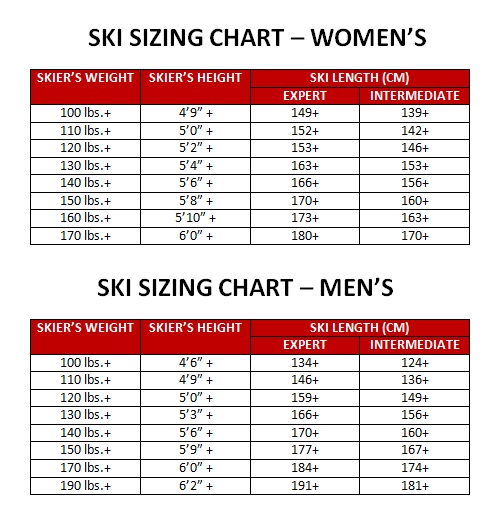Ski Length Chart: Find Your Perfect Ski Size
Choosing the right ski length can dramatically impact your skiing experience. Too short, and you'll feel unstable at speed; too long, and they'll be cumbersome and difficult to maneuver. This comprehensive guide explores everything you need to know about ski length charts and finding the perfect skis for you.
A ski length chart serves as a starting point for determining the appropriate ski size. These charts typically consider factors like your height, weight, and skiing ability. While not a definitive answer, they provide a valuable framework for narrowing down your options.
Understanding the nuances of ski length selection is crucial for maximizing your performance and enjoyment on the slopes. Whether you're a beginner or an expert skier, finding the right fit can significantly influence your control, stability, and overall skiing experience.
This guide will delve into the history and evolution of ski sizing, exploring the various factors that contribute to the perfect ski length. We'll also examine the importance of considering your individual skiing style and preferences when making your decision.
Navigating the world of ski sizing can feel overwhelming, but with the right knowledge and resources, you can confidently choose skis that enhance your abilities and elevate your time on the mountain.
Historically, skis were much longer than they are today, primarily designed for stability in deep snow and challenging terrain. As ski technology and techniques evolved, shorter skis became increasingly popular, offering greater maneuverability and control. Ski length charts emerged as a tool to help skiers navigate this shift and choose skis appropriate for their individual needs.
One of the main issues surrounding ski length charts is their inherent generality. While they offer a helpful baseline, they don't always account for individual variations in skiing style, terrain preference, or personal comfort. For example, a more aggressive skier might prefer slightly longer skis for increased stability at high speeds, while a beginner might opt for shorter skis for easier turning.
A ski length chart typically provides a range of recommended ski lengths based on a skier's height. This range takes into account different skill levels, with shorter skis generally suggested for beginners and longer skis for more advanced skiers.
For instance, a beginner skier who is 5'8" might be recommended skis between 150cm and 160cm, while an advanced skier of the same height might be suggested skis between 165cm and 175cm. These are just examples, and specific recommendations can vary based on the chart and the ski type.
Benefit 1: Enhanced Control. Properly sized skis allow for greater control and maneuverability on the slopes.
Benefit 2: Improved Stability. Skis of the correct length contribute to better balance and stability, especially at higher speeds.
Benefit 3: Increased Confidence. Choosing the right ski length can boost your confidence and overall enjoyment of the sport.
Advantages and Disadvantages of Using a Ski Length Chart
| Advantages | Disadvantages |
|---|---|
| Provides a helpful starting point | Doesn't account for individual skiing style |
| Simplifies the selection process | Can be overly simplistic |
FAQ 1: What if I fall outside the typical height range on a ski length chart? Consult with a ski shop professional for personalized recommendations.
FAQ 2: Do ski length charts apply to all types of skis? No, different ski types (powder, park, all-mountain) have specific length recommendations.
FAQ 3: Should I prioritize my height or weight when using a ski length chart? Both factors are important, and some charts incorporate both.
FAQ 4: Can I use the same ski length chart for kids and adults? No, there are separate charts designed for children's ski sizing.
FAQ 5: How often should I refer to a ski length chart? Whenever you're considering purchasing new skis or if your skiing ability has significantly changed.
FAQ 6: Are online ski length calculators a reliable alternative to charts? They can be helpful tools, but it's always best to consult with a professional for personalized advice.
FAQ 7: What other factors should I consider besides ski length? Ski width, turning radius, and flex are also important considerations.
FAQ 8: Can I demo skis of different lengths before making a purchase? Yes, demoing skis is highly recommended to find the best fit for your individual needs.
Tip: Consider your boot sole length when determining your overall ski length.
In conclusion, finding the right ski length is essential for a positive and enjoyable skiing experience. While ski length charts provide a helpful starting point, it's crucial to consider individual factors like skill level, skiing style, and terrain preference. Consulting with a ski shop professional or a qualified instructor can offer valuable personalized guidance. By taking the time to understand the nuances of ski sizing and choosing skis that align with your individual needs, you can unlock your full potential on the slopes and maximize your time on the mountain. Remember that a proper fit can significantly impact your control, stability, and overall confidence. Investing in the right skis will not only improve your performance but also enhance your enjoyment of the sport for years to come. Don't hesitate to ask questions and seek expert advice to ensure you make the best decision for your skiing journey.
Flipping the script the weird world of reverse airflow pc fans
Would squidward be happy if he got everything he ever wanted
Metric to us system conversion a simple guide














